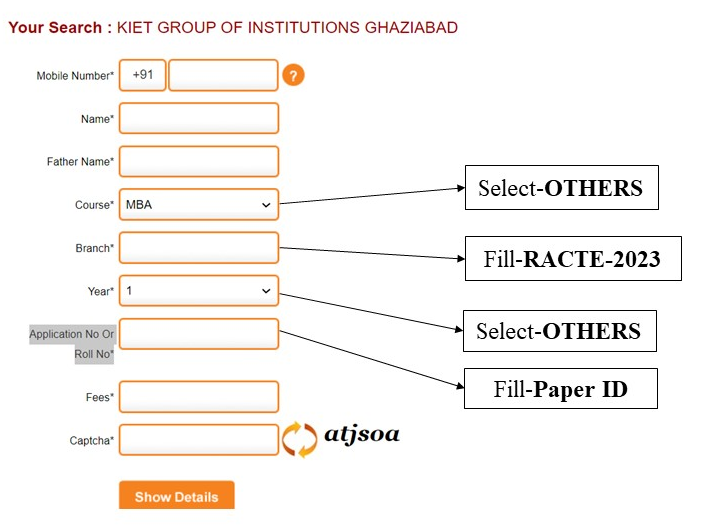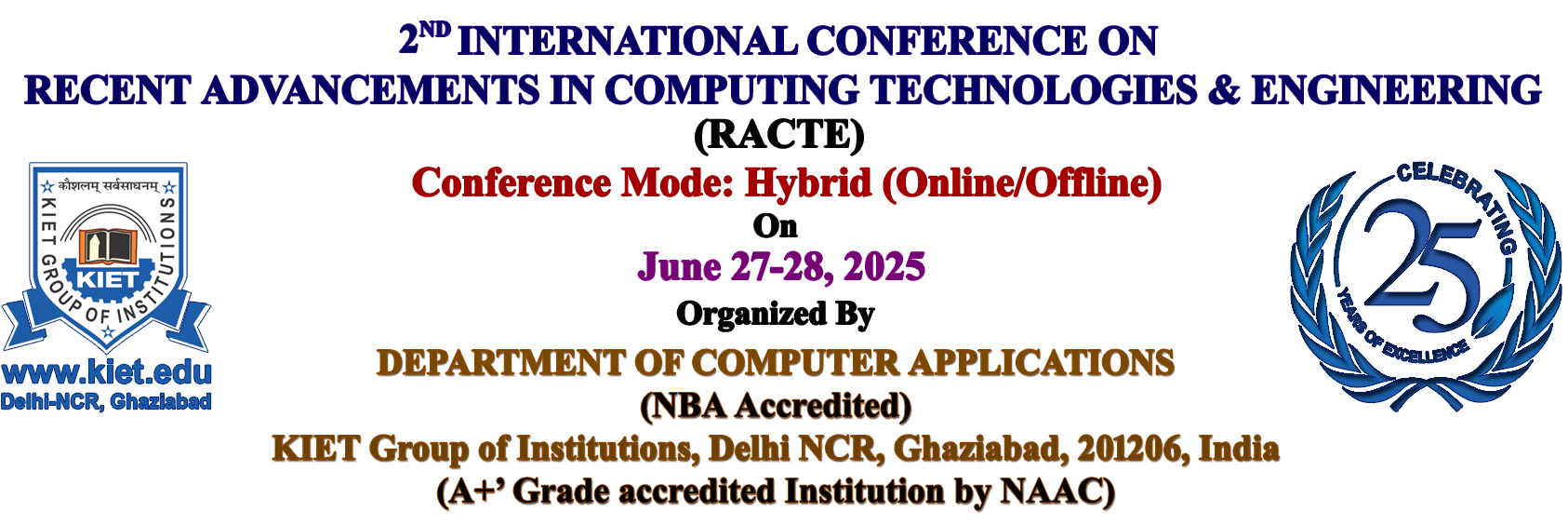Call for Papers
The scope of this conference is to provide a platform for researchers, engineers, academicians as well as industrial professionals from all over the world to present their research results and development activities in various topics of Engineering, Technology and multidiscipline. The conference is being organized specifically to help the industry derive benefits from the recent advances of in computing technologies and engineering.
Guidelines for Authors
RACTE-2023 is soliciting original, previously unpublished and high-quality research papers addressing research challenges and advances in the tracks mentioned below. Articles will be Blind Peer-Reviewed by at-least two experts to decide its suitability for publication in the conference. Authors are requested to send their papers strictly in AIP Conference Proceedings template.
AIP Conference Proceedings template [Download]
We follow the strict plagiarism policy. The Turnitin software will be used for plagiarism checking. The final camera-ready plagiarism report should not be more than 15%.
Paper Submission
Click here for a full-length paper submission.Registration
 Please send your documents to racte.ca@kiet.edu
Please send your documents to racte.ca@kiet.edu
After acceptance of the paper, intimation to authors will be sent and thereafter authors are required to register for the conference. For considering paper in the conference, at least one author has to register.
The registration fee is as follows:
| Category |
National Delegates (Early Bird) September 15, 2023 |
National Delegates October 10, 2023 |
International Delegates |
| Amount (INR) | Amount (INR) | Amount (INR) | |
| Author |
|
11500/- (Open) | 20000/- |
| Co-author / Listener / Participant | 1000/- | 5000/- | |
|
Payment through ICICI eazypay: https://eazypay.icicibank.com/eazypayLink?P1=ZgicSSklGa0EJj6FcPsSpg== Please fill in the information as given in the figure below: 
|
|||
Paper Publication
The peer reviewed papers after incorporating reviewers’ suggestions and having plagiarism less than 15% will be published in AIP Conference Proceedings indexed by Scopus.

Topics
The following are paper categories are welcome for submission-
Track 1A: Artificial Intelligence and Machine Learning
- Artificial Intelligence for Bioinformatics
- Artificial Intelligence for Mobile Apps
- Search heuristics
- Robotics and Control
- Machine Learning
- Evolutionary Computation
- Neural networks
- Natural Language processing
- Deep Learning
- Distributed Intelligent Information Systems
- Knowledge Management and Representation
- Reinforcement learning
- Semi-supervised learning
- Structured output learning
- Supervised learning
- Unsupervised learning
- Other machine learning methodologies
Track 1B: Block Chain
- Distributed consensus and fault-tolerant protocols design and analysis
- Security, privacy, confidentiality, and trust in blockchain
- Performance and scalability of blockchain systems
- Data partitioning and data replication in blockchain
- Blockchain-based applications and services
- Enhanced smart contract support in blockchain
- Data management services using blockchain
- Machine learning/artificial intelligence role in blockchain
- Blockchain in the edge and cloud computing
- Blockchain in the Internet of things (IoT)
- Governance and blockchain
- Provenance in blockchain
- Software engineering practices and life cycle management of blockchain
- Game theory and its applications to blockchain
- Blockchain social theory and societal impacts
- Experienced and industry innovations in blockchain
Track 2A: Computer Communication and Networking
- Cognitive, Cellular and Mobile Networks
- Antenna and Wave Propagation
- Communication Networks Architectures
- Network Algorithms, Measurement and Performance Evaluation
- Internet of Things (IoT)
- Wireless LAN, Ad Hoc, and Mesh Networks
- Data Centres and Big Data Computing
- Software Defined Networks and Network Virtualization Technologies
- Cloud Communications and Networking
- Quantum Networking
Track 2B: Data Science, Big Data and Data Mining
- Big data cloud, mining and management
- Big data storage, processing, sharing and visualisation
- Big data systems, tools, theory and applications
- Business analytics, intelligence and mathematics
- Computer science, hacking skills
- Informatics and information systems and technology
- Machine learning, web-based decision making
- Management science, social sciences and statistics
- Mathematical optimisation and mathematics of decision sciences
- Multiple source data processing and integration
- Network and social-graph analysis
- Optimisation, performance measurement
- Security and privacy
- System analysis and theory
- Volume, velocity and variety of big data on cloud
Track 3A: Internet of Things (IOT) and Robotics
- IoT Architectures
- (Syntactic/Semantic) Interoperability in IoT
- AI and Machine Learning for the IoT
- Edge AI/edge computing
- Web of Things including Hypermedia Agents for the IoT
- New IoT Communication Technologies
- Energy Efficiency and Sustainability in IoT
- Sensing, Signal Processing, Actuation and Analytics in Small and Large-scale pilots
- Security and Privacy in IoT
- Distributed Ledger Technologies for IoT
- Real-world Deployments, and Testbeds
- Novel Applications of IoT in Industry
- Societal Impacts and Ethical Implications of IoT
- Soft Miniature Robots
- Swarm of micro/nanorobots
- Mechatronics Systems for Small Scale Robotics
- Sensing and monitoring at small scale
- Actuation of miniature robots
- Autonomous robotics at small scale
- Medical imaging for real-time control
Track 3B: Emerging Technologies
- Intelligent IoT
- Industry 4.0
- Smart Sensing
- Smart Waste Management
- Intelligent resource management
- Embedded IoT
- Smart Agriculture
- Autonomous Vehicles
- Evolutionary Computing
- Information Retrieval
- Image Processing
- Computer Vision
- Object Recognition
- Information Retrieval
- Creating specialized datasets and standards
- Rough and Fuzzy Set
- Scalability of Learning Algorithms
- Statistical Learning
- Pervasive Computing and Ambient Intelligence
- Bioinformatics and Computational Biology
- Mechatronics
- Adaptive Systems
- Business Intelligence
- Semantic Web Techniques and Technologies
Track 4A: Cyber Physical System
- Cyber-Physical Systems Revolution
- Security of Cyber Physical Infrastructure
- Connectivity issues of Cyber-Physical Production Systems
- Artificial Intelligence and Cyber-Physical Systems
- Industrial Cyber-Physical Systems
- Knowledge-Based Decision-Making using CPS
- Action based learning Factories
- Ambient Assisted Living
- Cyber-Physical Systems and Education 4.0
- Smart Manufacturing Environments
- Human-based Industrial Cyber-Physical Systems
- Knowledge-Based Decision-Making using CPS
Track 4B: Multidisciplinary
- Engineering disciplines (Civil, Electrical, Electronics, Mechanical, Ocean, etc)
- Green and Renewable Energy
- Design & Technology
- Remote Sensing in Geography
- Innovations in Mathematics & Statistics
- Climate Change and Environmental Issues
- Agriculture, Forestry & Food Science
- Simulation & Modelling
- Graph Theory
- Optimization Technique
- Physics
- Chemistry
- Mathematics
- Applied Mathematics
- Pure Mathematics
